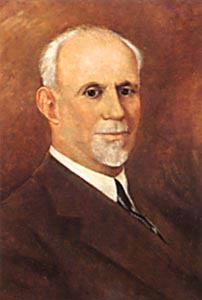|
Evrytania is a poem itself; a
hymn to the Timeless Creator and to eternal beauty and harmony. It would have
been impossible for such a lyrical environment not to affect the artistic sense
of the inhabitants. Almost every Evrytanean is a minor poet and singer. It would
be an unexpected lucky incident to come across a shepherd with his wooden flute,
competing with the nightingales themselves, filling with their sweet warbles the
forests and the thickets of the Evrytanic soil. Even today there is not a
marriage party or any festivity were you wouldn't listen to the old traditional
Greek songs. Lots of them deal with Love, Life, Emigration, or even Death
himself, in a special, clearly brave way.

So, in a place of such beauty and poetry, it was
natural for poets like Zacharias Papantoniou and
Stefanos Granitsas to flourish. Having grown
up with the purr of the water spring and the sweet lullaby of the goldfinch,
they felt deep inside them the sense of rhythm and harmony, at such a point that
when they had to leave their motherland, all these memories became an unbearable
burden and a torturing nostalgia.
Papantoniou's classic poem "Rumelie" (another name for Evytania and the broader
area, central Greece,pronounced Ru'-me-li) is exactly the one that gives the
identity of the region, not only in his days, but also today and in times to
come:
RUMELIE
My motherland, old Rumelie, i long for years to see
poor Karpenissi how you lulled me, so high above the sea.
Great plane trees quench their thirst in cold water
fountains
Sarakatsana* fills her jug and comes down the mountains
With crystal whistles disappear into the darkish site
blackbirds and shepherd boys with eyes forever being
bright.
Water buzzes down the cliff; and go up the skies
the fir-trees, like Rumelie's soul that always rise!
* Sarakatsana = A
woman of a certain Greek tribe, famous for her rich clothing.
But
in order to feel the unslaved soul of the Evrytanean, someone must meet
him closer, no description is possible to outline his magnitude and the
integrity of his character.
And
someone must see the Evrytanic land with his own eyes to be able, as he reaches
the end of his life, to say to his Creator:
The
Prayer of the Modest
Oh, Lord, as evening falls, I pray to you, alone.
No harm I meant to another soul except my very own.
I loved the men who gave me hurt completely to the core.
I bear my sorrows. I accept to bear even more.
All joys renounced myself; I don’t want them back.
I long for still worse to come. To hope is faith’s lack.
It seems to me like happiness -the wild night’s fear.
It’s only the wind that knocks on my door to hear.
I have no glory. Very quiet is everything I ’ve set.
I ‘ve listened to the falling rain and watched on a sunset.
I gave to children part of joy, a little pet to dogs.
I greeted ploughmen in the night, returning to their homes.
Now, I have nothing to regret, or anything to gain.
I don't expect some reward; too much this might
been.
Please, deign for me to die and come not ever back again.
I thank you for the mountains and for the fields i've seen.
Zacharias
Papantoniou, Greek poet, 1887-1940

I hope the translation of the poems does make some
sense. I understand that in some cases it must have a rather ...comic effect.
I have not the knowledge to be an accurate translator and -far more- I am not a
poet. The reason I tried to translate those verses in a more or less "poetic"
style is because I wanted you to sense the rime and the rhythmic meter in which
most Greek traditional songs are written.
Those poems are also written in the standard metric
of Greek traditional poetry, the iambus, in which we 've got two syllables with
the second being accented. The rhythm goes like this:
U_, U_, U_, U_... where "U"
is a non-accented syllable and "_" is an accented
one.
Moreover, most of these songs have a 15-syllable
line and I tried to maintain this too.
My apologies to anyone that is more relative to
literature than I am, but I have done my best. |